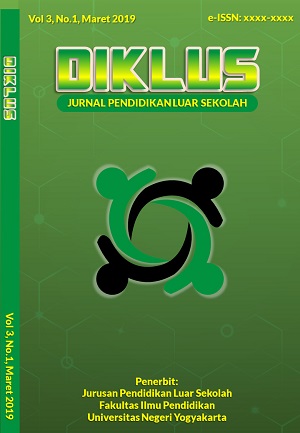Pembelajaran Diversifikasi Produk Olahan Bagi Pengrajin Emping Melinjo
DOI:
https://doi.org/10.21831/diklus.v3i2.27151Keywords:
pembelajaran, diversifikasi, perempuan, produkAbstract
Abstrak
Penelitian ini bertujuan mengembangkan kemampuan diversifikasi produk olahan berbasis potensi local bagi perempuan pengrajin emping melinjo sebagai upaya untuk memberdayaan kelompok dan warga masyarakat. Kemampuan diversifikasi ini perlu dikembangkan karena kelompok belum mampu mengembangkan produk bernilai jual tinggi dan meningkatkan kebermanfaatan usaha kelompok. Penelitian ini merupakan penelitian tindakan dengan tahapan pengkajian isu, perencanaan, pengimplementasian tindakan, dan refleksi. Tindakan berupa pembelajaran vokasional kepada para anggota kelompok di Desa Kalirejo,Kulon Progo. Data dikumpulkan dengan wawancara dan observasi dan dianalisis secara kualitatif yaitu direduksi, disajikan dan ditarik kesimpulan. Teknik keabsaha data dilakukan dengan pengamatan perpanjangan dan triangulasi. Hasil penelitian menunjukkan bahwa tindakan yang diberikan kepada kelompok sasaran memberikan perubahan positif berupa mereka dapat memiliki kesadaran untuk lebih inovatif dan memiliki pengetahuna dan keterampilan dalam produksi diversifikasi produk olahan berbasis potensi local. Oleh karenanya, tindakan berkesimbungan dan relevan perlu dilaksanakan kembali di masa depan dengan menyediakan fasilitas yang memadai.
Kata kunci: pembelajaran, diversifikasi, perempuan, produk
Abstract
This study aimed to develop the ability to diversify processed products based on local potential for women "emping melinjo" craftsmen in an effort to empower groups and community members. This diversification ability needs to be developed because the group has not been able to develop high-value-selling products and increase the usefulness of group businesses. This research was an action research with the stages of the study of issues, planning, implementing actions, and reflection. The action was in the form of vocational learning to group members in Kalirejo Village, Kulon Progo. Data collected by interview and observation and analyzed qualitatively that is reduced, presented and drawn conclusions. The validity of the data was done by observing the extension and triangulation. The results showed that the actions given to the target group gave positive changes in the form they could have an awareness to be more innovative and have knowledge and skills in the production of diversified products based on local potential. Therefore, relevant and relevant actions need to be implemented again in the future by providing adequate facilities.
Keywords: learning, diversification, women, products
References
Baron, Angela & Amstrong, Michae. (2007). Human Capital Management. Philadelphia: Kogan Page
Ife, Jim. (1997). Community development: Creating community alternatives-vision, analysis and practice. Melbourne: Longman.
Illeris, Knud. 2009. Contemporary Theories of Learning : Learning Theorists. New York: Taylor & Francis Routledge
Knowless, M.S., Holton III, E. F., & Swanson, R.A. (2005). The adult learner: The definitive classic in adult education and human resource development. Burlingtong: Elsevier.
Korten, David C. (1986). Community management: Asian experiences and perspectives. West Hartford C.: Kumarian Press.
Merriam, B. Sharan. & Brockett, Ralph G. (2007). The Profession and Practice of Adult Education. San Francisco: John Wiley & Sons, Inc.
McIntyre, A. (2007). Participatory action research (Vol. 52). Sage Publications.
Mí¼ller, Eduard., Apprleton, Michael., Ricci, Glenn, Valverde, Allan., Reynolds, David W. (2015). Capacity Development. Dalam Protected Area Governance and Management, oleh Graeme L. Worboys, Michael Lockwood, Ashish Kothari, Sue Feary, Ian Pulsford. Annu Press. Diakses dari https://www.jstor.org/stable/j.ctt1657v5d.16
Narayan, Deepa. (ed). (2002). Empowerment and poverty reduction: A sourcebook. Washington, DC. : The World Bank.
BPS Kabupaten Kulon Progo. (2018). Kecamatan Kokap Dalam Angka 2018. Wates: PT. Solo Grafika Utama
Downloads
Published
How to Cite
Issue
Section
Citation Check
License
Diklus: Jurnal Pendidikan Luar Sekolah allows readers to read, download, copy, distribute, print, search, or link to its articles' full texts and allows readers to use them for any other lawful purpose. Authors submitting a manuscript do so on the understanding that if accepted for publication, the copyright of the article shall be assigned to Diklus: Jurnal Pendidikan Luar Sekolah
 | Diklus: Jurnal Pendidikan Luar Sekolah is licensed under a Creative Commons Attribution-ShareAlike 4.0 International License. |













